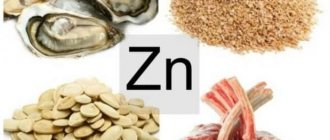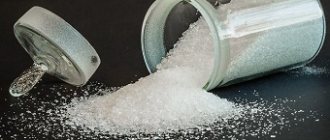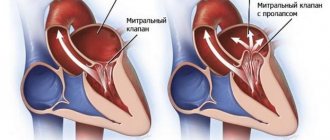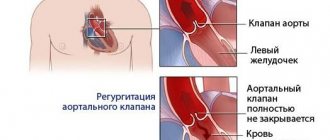It is amazing that in the 21st century, about 2 billion people on the planet are zinc deficient. You're especially likely to be one of them if you're over 50, diabetic, drink alcohol, vegetarian, take zinc-depleting medications, or have a bacterium in your digestive tract called Helicobacter pylori, which reduces stomach acid levels. necessary for the absorption of zinc.
The human body contains 2-3 grams (2000-3000 milligrams) of zinc.
Most of it is found in the adrenal glands, brain and eyes. Because most zinc is stored inside cells and not found in the blood, blood tests for zinc deficiency are notoriously inaccurate. And most doctors don't know about this!
On average, a person gets about 10 milligrams of zinc per day from food, but, at best, only 2-3 milligrams are absorbed. Foods fortified with zinc often do not affect the body’s supply of zinc, since the main problem of mineral deficiency is its poor absorption.
The situation is aggravated by the fact that modern medicine does not care about the deficiency of essential nutrients. Most doctors incorrectly teach that diet provides adequate nutrition; deal with each disease separately, without even trying to suggest that the ailment may be caused by a deficiency of certain vitamins or minerals.
Thus, the epidemic of zinc malnutrition continues unabated. And all the diseases associated with a deficiency of a vital mineral fill doctors' offices every day. Meanwhile, you can endlessly take medications for the heart, immunity, memory, etc., when just one tablet of a zinc drug could fix everything.
After all, zinc is a vital mineral for maintaining optimal health. Zinc is involved in the processes of cell reproduction, the functioning of the body's immune and antioxidant systems, regulation of metabolism and many other biological processes.
Why is zinc deficiency dangerous?
Common symptoms of zinc deficiency are: leaky gut syndrome, diarrhea, blindness (alcohol related), lack of appetite, loss of smell or taste, mental depression, weak immunity, hair loss, impotence, poor wound healing, acne, warts, mental dullness, dyslexia and growth retardation in children.
Severe zinc deficiency results in growth retardation in children, skin lesions, impaired wound healing, anemia, anorexia, visual impairment and even mental retardation.
- Metabolic processes in all organ systems. Zinc deficiency disrupts the activity of all zinc-containing enzymes and processes associated with increased cell growth and division (growth, regeneration, wound healing, spermatogenesis, DNA molecule stabilization), disrupts the exchange of proteins and nucleic acids, and reduces the overall level of energy processes.
- Embryonic development. Zinc deficiency is an unfavorable factor that has a teratogenic effect (developmental defects such as hydrocephalus, microophthalmia, heart defects, etc. can develop)
- The immune system. Zinc deficiency suppresses the immune system, which is manifested by frequent infectious diseases and impaired formation of immunity when children are vaccinated and is accompanied by a decrease in the mass of the thymus, lymph nodes, spleen, tonsils, and disruption of the normal formation of leukocytes and lymphocytes
- The cardiovascular system. Zinc deficiency is one of the causes of the development of chronic heart failure, coronary heart disease, and arterial hypertension.
- Digestive system. Zinc deficiency leads to the development of gastric and duodenal ulcers, chronic gastroduodenitis, Crohn's disease, celiac disease, and biliary tract diseases.
- Sensory systems. Zinc deficiency is manifested by dizziness, tinnitus, hearing loss, decreased sense of smell and taste, and can cause the development of cataracts.
- Endocrine system. Zinc deficiency disrupts the synthesis of insulin and hormones of the thyroid gland, pituitary gland, adrenal glands, prostate gland and testes.
- Nervous system. Zinc deficiency causes the development of depression and emotional lability, decreased concentration and memory, and peripheral neuropathies.
- Leather and its derivatives. Zinc deficiency disrupts the normal regeneration of epithelial cells and causes acne, seborrhea, alopecia, excessive sweating, psoriasis, and acrodermatitis enteropathica.
- Male reproductive system. Zinc deficiency slows down puberty, disrupts the process of spermatogenesis, reduces testosterone levels, and increases the risk of developing prostate adenoma.
- Female reproductive system. Zinc deficiency negatively affects all estrogen-dependent processes and is one of the causes of menstrual irregularities, ovulation, PMS, premature birth, toxicosis during pregnancy, and the birth of an immature fetus with a deficiency in weight or developmental defects.
Why is zinc needed in a woman’s body?
It takes part in the regulation of brain activity and strengthening of nerve fibers.
Takes direct part in the synthesis of some hormones and neuronal mediators. One of which is serotonin. Zinc is involved in the production of serotonin, the hormone of happiness, which provides us with an excellent mood and positive emotions. Which in turn determines the psychological status, reduces depressive readiness, and increases resistance to stress. For this purpose, zinc supplements for women are used.
Hormonal balance is also important. This is associated with normal gestation, prevention of miscarriages and premature births.
In addition, this mineral takes an active part in the regulation of reproductive function. Thanks to its sufficient content, the absence of PMS symptoms, a calm pregnancy, and the absence of premature menopause are ensured.
The necessary zinc content ensures good vision. This is due to the participation of the trace element in the metabolism of nerve fibers, the synthesis of neurotransmitters and the normal functioning of the macula. Zinc maintains visual acuity and prevents myopia.
Our mineral regulates defenses by promoting the production of antibodies and blood leukocytes, which supports stable immunity. With zinc deficiency, almost the entire immune system suffers.
Thanks to the normal zinc content, the fairer sex has well-groomed and strong hair and nails. Signs of zinc deficiency in women: hair splits and falls out, loses its usual shine, nails become brittle, white spots appear, and flake.
Due to participation in lipid metabolism, beautiful skin is formed. Zinc reduces the manifestations of allergic skin reactions, acne, reduces dry skin, prevents early wrinkles, and regulates sebum secretion of the skin. To eliminate these clinical manifestations, dietary supplements for women are used. The first place among them is zincite.
What vitamins are best for hair and nails
First of all, these are vitamins A, E, C, F. They work in combination with selenium and zinc.
Complex drugs are prescribed only after examining laboratory parameters to ensure that there is a real deficiency of this microelement, since similar symptoms may occur with other deficiencies. The above compounds are good vitamins for hair, nails and skin for women. They participate in metabolism, contribute to the renewal of the surface layers of the epidermis, which stimulates rejuvenation and a beautiful appearance.
Where is zinc found?
Let's start with food.
The body receives most useful minerals from food. Vitamins with zinc for women are found in many foods: turkey, egg yolk, beef, seeds and nuts, buckwheat, seafood, oatmeal, bran, cheese, dairy products. If you clearly have a zinc deficiency, then vitamins for hair, nails and skin containing zinc, as well as dietary supplements for hair and nails, can come to your aid.
Diagnosis of zinc deficiency
Most zinc is stored inside cells, making it difficult to detect a deficiency with a simple blood test. Thus, low blood levels of zinc indicate deficiency, but adequate blood levels of zinc are not necessarily a reliable indicator of micronutrient sufficiency.
Because plasma zinc levels do not correlate with zinc intake, such a test cannot be used to determine the effectiveness of zinc supplements.
Other tests for zinc deficiency include a urine test and a hair strand test to measure zinc levels.
Sources of zinc
To prevent zinc deficiency, you should include in your diet:
- seafood,
- hard cheeses,
- whole milk,
- pork and chicken,
- liver, kidneys and other offal,
- flax and pumpkin seeds,
- Pine nuts,
- honey.
An additional source of zinc and other valuable elements necessary to maintain men's health will be the Man's formula® Prostate Forte™ biocomplex. It is designed specifically for men and has a balanced composition.
- Zinc stimulates testosterone production and helps maintain prostate health.
- Vitamin E rejuvenates cells and protects them from damage by free radicals.
- Pumpkin seed extract has a diuretic and anti-inflammatory effect, relieves the symptoms of prostatitis.
- Extracts of African pygeum and dwarf palm slow down the growth of prostate adenoma, relieve swelling and improve blood supply to the prostate gland.
You need to take a biocomplex with zinc and vitamins for the prostate in courses. Rules for use and dosage are given in the instructions.
Zinc Supplements: Dosage
The recommended daily intake (RDA) for zinc is just 15 milligrams per day for adult men and 8 mg for women. However, this norm should definitely be increased for:
- older people, who usually have difficulty absorbing zinc;
- vegetarians;
- people infected with Helicobacter pylori, which turns off the secretion of stomach acid;
- people taking drugs that destroy zinc (ACE inhibitors, histamine blockers, diuretics, beta blockers, cortisone, estrogen, steroidal anti-inflammatory drugs.
Of course, in order not to experience a dangerous deficiency, you can look for foods rich in zinc. But frankly, other than oysters (about 74.0 mg of zinc per 90 grams), modern food cannot provide a person with enough micronutrients.
If there is a deficiency of the mineral, it is optimal to take 10-25 mg of zinc daily in the form of zinc-containing dietary supplements, for example, the drug ZINC AP from.
The drug ZINC AP was created to qualitatively replenish zinc deficiency in the body. The drug contains zinc citrate - one of the best sources of zinc in terms of bioavailability. 1 tablet of ZINC AP contains 12 mg of the mineral and regular intake of 1-2 tablets of ZINC AP per day will help maintain the body in an active, healthy state.
How to find out which microelements are missing in the body? / "www.inthecity.ru"
Return to list
When choosing a vitamin-mineral complex at the pharmacy, we first of all pay attention to how much vitamins C, B and E it contains as a percentage of the daily value. We usually ignore the inscription informing about the content of zinc, magnesium, selenium and phosphorus in the preparation. Yes, we know that it is good for the body. But who wants to remember school chemistry?
Meanwhile, there are 86 microelements in the human body. Some of them are called structural, since they make up 99% of the elemental composition of the human body. These include: carbon, oxygen, hydrogen, nitrogen, calcium, magnesium, sodium, potassium, chlorine, phosphorus, sulfur, iron. The growth, development and health of the body directly depend on the amount of minerals: they affect hematopoiesis, bone formation, absorption processes in the intestines, are responsible for the acid-base balance, perform the function of nerve conduction, intracellular respiration and much more.
Unfortunately, living in the city, we receive not only useful microelements. Our health is at risk from the accumulation of heavy metals that cause intoxication, or, more simply, poisoning. Symptoms of the accumulation of mercury, lead, arsenic, cadmium, nickel are weakness, sleep and appetite disturbances, irritability, dull skin and hair, broken nails and, of course, memory deterioration, concentration decreases, and vision deteriorates. Tatyana Semenchenya, a doctor at the independent INVITRO laboratory, talks about the role of each element in the human body.
Copper
The largest amounts of copper are found in the liver, kidneys, heart and brain. And this microelement is excreted mainly with bile. Copper poisoning when it is contained in excess in water or food products and enters the body in large quantities is accompanied by nausea, vomiting, diarrhea, which can lead to the development of hemolytic anemia, renal and liver failure, and neurological disorders. Copper deficiency can lead to anemia and, in premature babies, to delayed psychomotor development.
Selenium
The role of selenium is not yet fully understood, however, it is believed that selenium has an antioxidant effect on the body, slowing down aging. Stimulates the production of collagen in the skin to maintain elasticity and helps eliminate dandruff.
In combination with vitamin E, selenium participates in the processes of reproduction, development of a young body and in a certain way affects life expectancy. When it is deficient, arsenic and cadmium accumulate in the body and calcium levels decrease. Selenium supports the functioning of the immune system. It can also reduce the likelihood of developing cancer.
Zinc
Foods that contain zinc are cereal grains, legumes, cocoa, seafood, mushrooms, onions, potatoes, and cow's milk. Zinc affects the hormonal levels of the body, is responsible for puberty, and affects fat, protein and carbohydrate metabolism. It is believed that zinc has a lipotropic effect, that is, it is able to break down fat cells.
It is also necessary to remember about a possible excess of this substance in the body, which can lead to growth retardation. A lack of zinc contributes to overexcitation of the nervous system, rapid fatigue, hair loss, and threatens infertility.
Iodine
A unique substance that is part of all plants. Iodine deficiency can lead to serious diseases - and this is not only thyroid disease, as is commonly believed, but also the development of mental retardation - cretinism - precisely in childhood! If there is a lack of iodine, the child stops growing and the entire structure of the body changes.
Excess iodine is characterized by sweating, irritability, tachycardia (rapid heartbeat), a person loses weight, a tendency to diarrhea, and exophthalmos (bulging eyes). This trace element is found in kelp (brown seaweed), onions, all seafood, as well as in vegetables grown in soil rich in iodine.
Potassium
Potassium is necessary for the human body for mental clarity, concentration, and also for getting rid of toxins. The main symptoms of potassium deficiency are delayed puberty, slow growth; with severe potassium deficiency, convulsions and cardiac dysfunction are possible. Potassium is found in tomatoes, bananas, potatoes, sunflower seeds, and citrus fruits.
Calcium
With a lack of calcium, tachycardia, arrhythmia (heart rhythm disturbance), muscle pain, constipation, whitening of fingers and toes, increased irritability, dullness, memory loss, decreased vision, broken nails, and hair loss are observed. Excess calcium is accompanied by muscle weakness, difficulty coordinating movements, bone deformation, nausea, vomiting, and frequent urination. Also, excess calcium can lead to a deficiency of zinc and phosphorus.
Calcium is contained in both plant and animal foods in the form of insoluble salts; their absorption into the intestines practically does not occur. Calcium metabolism is regulated by the parathyroid glands.
Magnesium
Magnesium is an essential component of all cells and tissues, including brain tissue. Participates in the process of neuromuscular excitability and is part of enzymes. Enters the body with water, food and salt. Found in large quantities in plant foods - almonds, dark green vegetables, bananas, nuts, figs.
With magnesium deficiency, symptoms of nervous system excitation, including seizures, are observed. A decrease in magnesium concentration leads to excess calcium and phosphorus deficiency. Phosphorus
Phosphorus plays an important role in all processes of our body and is involved in the construction of numerous enzymes responsible for cell life. And its salts make up the tissue of our skeleton.
With phosphorus deficiency, changes in bone and muscle tissue, memory loss, fatigue, and irritability are noted. With an excess of phosphorus, acute poisoning occurs, abdominal pain, vomiting are observed; an excess of this element can lead to death.
What to do?
If a person does not suffer from chronic diseases, monitors his diet, plays sports, spends enough time outside the city, in the fresh air, the likelihood of an acute shortage of any vitamins and minerals is small.
If any problems arise (even if it is “just” increased fatigue, irritability, sleep disturbances) or when planning large loads on the body (for example, pregnancy), it would be useful to undergo an analysis to determine microelements in the blood. Using this analysis, you can assess the state of the body in terms of resistance to chronic, endocrinological diseases, stress, and determine the deficiency of certain substances in the body.
It is recommended to do this analysis:
- children and rapidly growing teenagers
- To old people
- those planning pregnancy, pregnant women and nursing mothers
- people with chronic diseases, diseases of the endocrine system, suffering from intestinal dysbiosis, and those who often catch colds
- girls who are passionate about diets
- workaholics who work 24 hours a day
- living in unfavorable ecological zones
Where to get tested
Network of laboratories "INVITRO"
Analysis can be done on blood, hair and nails.
Examination “ME Profile 1” (main vital microelements: selenium, copper, zinc) - 990 rub. Adding other microelements - 200 rub. for every.
The analysis period is up to 6 working days.




![Selenium [converted]-04-1.jpg](https://laram-halal.ru/wp-content/uploads/selen-preobrazovannyj-04-1-jpg-330x140.jpg)



